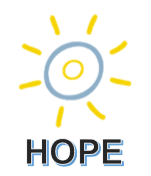HOPE E-COURSE for FORMAL CAREGIVERS -ENGLISH
Résumé de section
-
ERASMUS+ HOPE
KA220-HED-F8D51393, Higher Education
Responding to Heatwaves in the Older People Ecosystem

HOPE: E-learning for caregivers
- The e-learning will be built up with text, and illustrations (video, pictures, and stories) based on the experiences and cases of the participating (associated) partners in the project and assignments. There will be attention to the comparison between different situations, especially in the assignments. This will stimulate users of the e-learning to understand the impact of the context is on how to address heat-related health problems.
- The presentation of the e-learning will contain visual materials, as part of so-called blended learning. This will result in a better ‘sticking’ of the knowledge gained
- The result will be cross-country learning and exchange of knowledge between the partners as well as disciplines.
- As the e-learning is in English it will be easy to use in the different countries involved. After finishing the development of the e-learning, it will be easily accessible to other interested parties.
- PARTNERS
- GEMEENTE ROTTERDAM Netherlands, www.rotterdam.nl
- ISTITUTO PER SERVIZI DI RICOVERO E ASSISTENZA AGLI ANZIANI, Italy, https://www.israa.it
- IRMANDADE DA SANTA CASA DA MISERICORDIA DA AMADORA, Portugal , https://www.misericordia-amadora.pt/
- STICHTING HOGESCHOOL ROTTERDAM, Netherlands, https://www.hogeschoolrotterdam.nl
- Social Cooperative Enterprise of Cyclades, GREECE, https://e-learning.alteravita.eu/
- ELISAN RESEAU EUROPEEN POUR L INCLUSION ET L ACTION SOCIALE LOCALE
ASSOCIATION, France, https://elisannetwork.wixsite.com/elisan-network
HOPE WEB PAGE: https://hope-heatwaves.eu/
DISCLAIMER
The European Commission’s support for the production of this publication does not constitute an endorsement of the contents, which reflect the views only of the authors, and the Commission cannot be held responsible for any use which may be made of the information contained therein.

-
Dear student, as a warming up to this module please watch this video.
-
-
Welcome to module 3 of the e-learning, to get started please watch this videoclip.
-

-
-
INTERACTIVE MAP -GOOD PRACTICES
HOPE- GOOD PRACTICES
-
-
GOOD PRACTICES: STARTING THE COLLECTION
Based on the work of all project partners and the information gathered, the HOPE project will develop an online database of good practices around older adult care during the heat waves, which will be shared worldwide. ISRAA Treviso will have a leading role in its development. The project results will be implemented in the own care services of the partners and available for use, replicability and adaptation to all interested Authorities. The Portuguese partner (SCMA) will be responsible for the development of the Guidelines for the older adult ecosystem on the topic of heat management. These guidelines recommend how to manage older adults' care before, during and after the heat waves. Together with the associated partners of Rotterdam, Genero (network of older adult organisations); SOL Network (welfare institution and supplier of welfare services); Laurens(organisations for older adults care), Treviso (Province of Treviso; Municipality of Treviso, ULSS 2 Marca Trevigiana) and Portugal Amadora (Municipality of Amadora; Lusofona University) and the Local Advisory Boards, we will collect the best practices and research about the ecosystem on what is currently done in heatwave management, what is missing and what works well.
What is meant by “Good practice”
A good practice is not only a practice that is good, but a practice that has been proven to work well and produce good results, and is therefore recommended as a model. It is a successful experience, which has been tested and validated, in the broad sense, which has been repeated and deserves to be shared so that a greater number of people can adopt it. Or ‘Good practices’ can be defined in multiple ways. However, a thread common to most definitions implies strategies, approaches and/or activities that have been shown through research and evaluation to be effective, efficient, sustainable and/or transferable, and to reliably lead to a desired result. (European Commission)
The Criteria:
- Effective and successful;
- Environmentally, economically and socially sustainable;
- Gender-sensitive;
- Technically feasible;
- Inherently participatory;
- Replicable and adaptable;
- Reducing disaster/crisis risks, if applicable.
If you have a good practice regarding heatwaves and you would like to share it please contact us. lead ISRAA Treviso and elena.curtopassi@regione.veneto.it
Here is the e -database of the Good Practices
-
-







